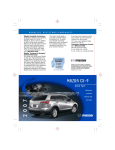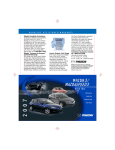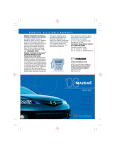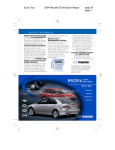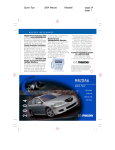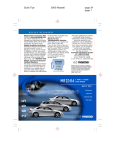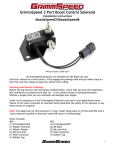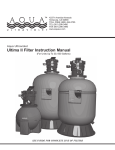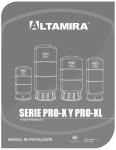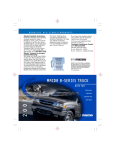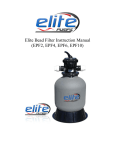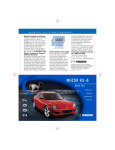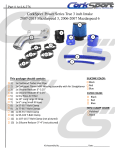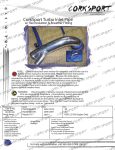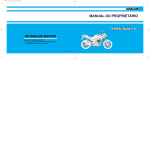Download Mazda MAZDASPEED6 Quick Tips
Transcript
ROADSIDE ASSISTANCE/WARRANTY Mazda Roadside Assistance Exhilaration, liberation and inspiration, are great reasons to drive a Mazda car, truck, SUV or minivan. In addition to all the other great standard features, you also get peace of mind with our basic warranty period Emergency Roadside Assistance Plan, it’s just a phone call away, 24 hours a day, 365 days a year, call 1-800-866-1998. Mazda ‘’bumper-to-bumper” Limited Warranty We design and build every Mazda to give you driving pleasure now and far down the road. We’re so confident in our quality that we cover the entire vehicle against defects in materials and workmanship for 36 months/36,000 miles, whichever comes first, plus we provide a powertrain warranty for 60 months/ 60,000 miles, whichever comes first. Premium Unleaded Gasoline Only 91-93 octane 15.9-gallon/ 60.0-liter tank Lower Octane Fuel Usage If 91 octane fuel is not available, fuel as low as 87 octane can be used temporarily for emergency purposes, use of fuel lower than 91 octane can decrease performance, refueling vehicle with correct octane fuel a couple of times will restore vehicle performance. This Quick Tips® guide is provided by Mazda Motor of America, Inc. to make your Mazda ownership experience more convenient. It is not intended to replace your Owner’s Manual. If you have any questions about your vehicle, you are invited to contact your local dealer. Or if you need additional help, feel free to call our Customer Assistance Center at 1-800-222-5500 Monday through Friday, 8 a.m.- 4:45 p.m., Pacific 9 a.m.- 5:45 p.m., Eastern/Central ©2006 Calcar, Quick Tips® is a trademark of Calcar, made in USA 5/06 10.436M DOT ©2006 Mazda Motor of America, Inc. reserves the right to change product specifications at any time without incurring obligations. 9999-95-MS6C-07QT MAZDASPEED6 Quick Tips ® Reference Guide for 2007 Controls and Functions ® DRIVER’S VIEW 1 2 3 4 56 7 8 9 10 P R N D M H C 2 11 12 13 14 15 16 F TRIP A 8 O.O E 5 17 18 33 32 31 30 34 35 1. Power window switches, see Getting Started 2. Power door locks 3. Dual power mirrors 4. Headlight leveling switch Adjusts headlight angle to compensate for weight of passengers and cargo, adjustable from highest (0) to lowest (3) positions, see Owner’s Manual 5. Air vents 6. Instrument panel lighting 7. DSC OFF Traction Control/ Dynamic Control System off, see Driving Tips 8. Turn signal/lighting control lever, see Driver Controls 9. Horn/air bag 10. Wiper/washer control lever, see Driver Controls 29 28 27 26 19 20 21 22 23 24 Getting Started MAZDASPEED6 Quick Tips® are designed to quickly familiarize you with some important features of your MAZDASPEED6 This Driver’s View tab is your index to the Quick Tips®, locate the item you would like to learn more about and then turn to the listed tab Be sure to see the tab called Getting Started, this section contains important operating tips about your MAZDASPEED6 Items identified in blue text call out important information 25 11. Clock/set buttons, see Information Display 12. NAVI screen tilt* 13. Storage or NAVI system* NAVI system is used to locate street addresses, points of interest or cross streets: see your Owner’s Manual for additional operating information 14. Information display, see Information Display 15. Open/close NAVI screen* 16. AMB, see Information Display 17. Hazard warning switch, Press on/off 18. Audio system, see Audio Systems 19. Climate control panel, see Climate Controls 20. Passenger air bag off indicator, see Safety 21. Ashtray/lighter 22. Gearshift lever, see Transmission 23. Cup holder 24. Heated seats* 25. Console 26. Accessory socket 27. Parking brake lever 28. NAVI system remote control* 29. Cruise control 30. Tilt/telescopic steering-wheel lever 31. Audio control switches, see Audio Systems 32. Storage 33. Hood release handle 34. Bottle holder CAUTION: Use plastic bottles with caps, cups may spill when door is closed 35. Remote fuel-door release *Denotes optional equipment Always check the Owner’s Manual for more operating information and safety features Driver’s View Getting Started GETTING STARTED 3 Advanced keyless entry/ start system* Advanced key must be carried 4 by driver to operate properly Advanced keyless system customization Your authorized Mazda Dealer can customize your system if desired with features such as auto-lock: After exiting the vehicle after driving, the car will automatically lock For additional information, see Owner’s Manual WARNING: Never leave a child alone in vehicle and never leave any key where a child can find it, particularly advanced keys which give easier access to a curious child Trunk request switch: Press (6) on trunk lid, only trunk will unlock, doors do not lock/unlock To open trunk: Reach under license 5 Handle plate light shield and pull release handle (7) Locking doors Advanced key transmitter: Press Driver’s/passenger’s door request button (2) for driver’s door; press switch: Press (5) once on either again within 3 seconds to unlock door to lock all doors passenger’s doors and trunk Advanced key transmitter: Press button (1); pressing again Trunk security within a few seconds causes doors Request switch on trunk lid can be set so it cannot be unlocked to relock and horn to beep with valet key, or advanced Unlocking doors/ keyless remote, to enter or opening trunk Driver’s door request switch: Press exit valet mode; press request switch (6) for 5 seconds (5) to unlock driver’s door; press Activating panic alarm again within 3 seconds to unlock Press and hold button (3) for more all doors and trunk than 1 second; horn sounds, hazard Passenger’s door request switch: warning lights flash; to stop, Press (5) on passenger’s door; press any remote button all doors and trunk unlock *Denotes optional equipment simultaneously Starting engine Push start knob (8); when KEY indicator illuminates on 9 8 9 instrument cluster; turn start knob (8) to START position to start engine Tip: Engine will not start if trunk is open and advanced key is placed in trunk Auxiliary key operation If advanced key cannot be used due to a malfunction or dead battery, use auxiliary key (4) to lock/unlock doors, trunk and to start vehicle To start vehicle: Remove start knob cover (8) by pressing both side release buttons (9) while pulling; insert auxiliary key into key cylinder and turn to start engine Tip: Do not place advanced key on or around dashboard, storage compartments such as glove box or in open trunk, engine may not start or warnings may activate Turning off engine Turn start knob to ACC position to turn engine off, push in and turn start knob to LOCK position Tip: Vehicle battery may be discharged and power locks will not function if start knob is left in ACC position Always set parking brake and turn start knob to LOCK position when exiting vehicle System operation warnings KEY indicator light flashes (green) indicates advanced key transmitter battery power is low KEY indicator light illuminated continuously (red) indicates system malfunction, and auxiliary key should be used, have vehicle inspected at an Authorized Mazda Dealer as soon as possible 1 2 LOCK ON S TA RT C AC PUSH 6 7 Tip: When using advanced keyless system, system will beep as confirmation of lock/unlock requests, system will also beep if start knob is left in ACC position, advanced key has been left in vehicle or if advanced key is removed from vehicle while vehicle is running For additional system operation warnings, see Owner’s Manual Replacing battery See Owner’s Manual for complete instructions Cautions on use To avoid damage to advanced key, do not allow any severe impacts or contact with liquids, do not place heavy objects on advanced key and do not leave advanced key exposed to direct sunlight or high temperatures See Owner’s Manual for all cautions and warnings Always check the Owner’s Manual for more operating information and safety features Getting Started Getting Started GETTING STARTED MAZDASPEED6 Turbocharger tips To get maximum performance from your turbocharged engine, take note of the following: Use 91-93 octane premium unleaded gasoline ONLY, extra fuel additives are NOT recommended Change engine oil and filter every 7,500 miles, or sooner if needed, see Owner’s Manual Use engine oil with API SL or ILSAC GF-3 service grade or higher, extra oil additives are NOT recommended Remote window operation Windows can be opened/closed from outside vehicle when doors and trunk are closed Opening windows with Remote keyless entry: Press unlock button (2) and hold it, doors and trunk unlock and windows fully open Key/Auxiliary key: Insert key in driver’s door lock; turn toward front/rear of vehicle and hold it, after doors and trunk are unlocked/locked windows will open/close Closing windows (Advanced key): with doors and trunk unlocked; press and hold request switch on driver’s door handle, doors and trunk will lock, then windows will fully close After driving at freeway speeds or up a long hill, idle engine at least 30 seconds to cool turbo, avoid shutting engine off abruptly after a hard or long drive, turbocharger damage may result otherwise Do NOT race or over-rev ANY engine when starting, particularly a turbocharged engine Do NOT add aftermarket devices to alter the engine’s ignition, fuel delivery, or turbo boost pressure, this may lead to serious engine damage and void your warranty 5 4 4-Window auto open/close with anti-pinch function One-touch open/close: Push down/ pull up AUTO switches (4) firmly and release, window opens/closes all the way; pull/push back briefly to stop window; press/pull lightly and hold for normal operation Tip: During closing window operation, window will stop and open partway if object blocks window operation Power window lockout switch Press button (5), only driver’s window operates; press again for normal operation Remote keyless entry 1 system 2 Functions only 3 with ignition in OFF position To lock doors: Press button (1); pressing again within a few seconds causes doors to relock and horn to beep To unlock: Press button (2) for driver’s door; press again within 3 seconds to unlock passenger’s door and trunk Panic alarm: Press and hold button (3) for more than 1 second; horn sounds, hazard warning lights flash; to stop, press any remote button Power window initialization procedure If battery is disconnected or power window fuse is replaced, the auto open/close and anti-pinch features will not function Resetting procedure: 1. Turn ignition switch to “ON” position 2. From driver’s seat, ensure power window lockout switch (5) is NOT depressed 3. Press power window switch down to fully open window, then pull switch up to close window completely, continue holding switch up for at least 3 seconds, then release switch 4. Repeat Step 3 for each front and rear window 5. After all windows have been initialized turn ignition to “LOCK”, then back to “ON” Always check the Owner’s Manual for more operating information and safety features Getting Started Instrument Cluster INSTRUMENT CLUSTER 1 3 7 15 16 15 8 4 14 13 6 80 100 5 2 6 1 H 7 0 2 x1000rpm/m 8 C P R N D M 2 60 40 20 120 100 9 200 140 220 60 240 40 260 20 280 11 160 mph 0 8 O.O TRIP A 12 24 23 22 10 21 20 19 18 120 140 160 180 80 F 180 5 3 E 4 17 GAUGES 1. Tachometer 2. Speedometer 3. Fuel gauge 4. Odometer/tripmeter selector Press to select among trip A, trip B, and odometer Press and hold to reset selected trip meter 5. Odometer/tripmeter 6. Engine coolant temperature gauge If above normal range, stop vehicle and turn off engine, check coolant level when safe WARNING LIGHTS DSC 11. OFF Traction Control/ Anti-lock Brake Dynamic Control System off System (ABS) ABS malfunction, normal brakes 12. Always fasten only, dealer inspection required seat belts 8. Dynamic Stability 13. CRUISE Cruise control Control (DSC), CRUISE see Driving Tips 14. MAIN Cruise control main power on 9. 4WD 15. Turn signals/hazard 10. Air bag readiness warning on Front, side and curtain air bag malfunction; warning light 16. High beams on constantly flashes or stays on or never comes on with ignition 17. Low fuel on, dealer inspection required 18. Brake system Parking brake on/low fluid level 7. 19. Check engine Dealer inspection required 20. Charging system warning light Dealer inspection required 21. Engine oil pressure warning light 22. 23. Door ajar Immobilizer system on 24. KEY*, see Getting Started *Denotes optional equipment Always check the Owner’s Manual for more operating information and safety features Instrument Cluster Driver Controls DRIVER CONTROLS Turn signal/xenon lighting control lever OFF = Lights off 1 2 Tip: Lights switch off automatically within 30 seconds if lights are left on and switch is in lock position or key removed 1 = Tail, parking and dashboard lights on: Rotate knob (1) to first notch = Tail, parking, dashboard and headlights on: Rotate knob (1) to second notch High beams on/off: Push lever forward/pull back to detent To flash high beams: Pull lever back slightly and release Turn signals right/left: move lever up/down = Fog lights on: Rotate knob (2); functions only with headlight low beams on Headlight leveling switch, see Driver’s View Wiper/washer control lever Intermittent wiper: One click down To change interval speed: Rotate inner ring (1) Normal wiper speed: Two clicks down Fast wiper speed: Three clicks down Single wipe: Push lever up Washer: Pull lever back Speed sensing windshield wipers: Wiper speed varies depending on vehicle speed for optimal operation, see Owner’s Manual Manual transmission Depress clutch pedal to start engine and change gears To engage reverse, push shift lever down and move towards “R” position All-wheel drive operation Active torque split all-wheeldrive with limited-slip rear differential provides excellent driveability Tip: AWD equipped vehicle should be driven the same as a non-AWD vehicle, and always with emphasis placed on safe driving WARNINGS: Do not shift into 1st above 20 mph or clutch failure could occur Resting your foot on clutch pedal while driving and using the clutch to hold your vehicle at a stand still while waiting on a hill may reduce clutch life Always check the Owner’s Manual for more operating information and safety features Transmission Seats SEATS WARNINGS: Do not adjust seats while driving Seat belts must always be worn when vehicle is in motion Air bags are supplemental and do not replace seat belt usage Always wear your seat belt and properly secure children 12 and under in 4 the rear seat 8 WARNINGS: Even with a deactivation system, never place rear-facing infant-safety seat in front of any air bag, an infant is in serious danger of being injured or killed If you must install a forwardfacing child-safety seat in the front seating position, move vehicle seat as far back as possible Use age appropriate child restraints, see Owner’s Manual and state or province laws Passenger air bag deactivation indicator light Front air bag deactivation indicator light provides current status of front passenger air bag and pretensioner system If total seated weight on front passenger seat is less than approximately 66 lb., front passenger air bag deactivation indicator light illuminates, front and side air bags/ pretensioner will not deploy/activate in an accident If the total seated weight is greater than approximately 93 lb., light does not illuminate, and the front and side air bags/pretensioner will deploy/activate in an appropriate accident, see Owner’s Manual for additional information on this feature and the air bag system Child-safety seat See Owner’s Manual for proper installation and child seat tether and LATCH system instructions Automatic locking mode (front passenger and all rear seat belts only) Must be used when installing child-safety seat To activate: Pull webbing fully out of retractor, allow belt to retract until click is heard; belt will only tighten To disengage: Unbuckle belt and allow webbing to retract fully 5 7 1 2 6 3 5. Lumbar adjustment Pull lever (5) repeatedly up to 3 times for greater lumbar support Power driver’s seat* 6. Raise/lower front of seat cushion Pull/push front of switch vertically Fore/aft adjustment Slide switch horizontally Raise/lower rear of seat cushion Pull/push rear of switch vertically Raise/lower seat Pull/push center of switch vertically 7. Seatback angle Press front/rear of switch Tip: Verify side air bags by locating “SRS AIRBAG” indicator tags on outboard side of front seatbacks *Denotes optional equipment Seat belt emergency locking mode Belts lock only on hard acceleration, braking, cornering or impacts of about 5 mph or more Child-safety locks Located at the edge of rear doors To activate: Pull tab up to lock door; door opens from outside only To cancel: Push tab down WARNING: Since children may access either rear door, child-safety locks for both rear doors should be activated Trunk internal safety release Located on interior trunk lid; slide illuminated release lever in direction of arrow; lever glows if exposed to light Lock Unlock OPEN Shoulder belt height adjustment To raise: Push adjuster upward 1 To lower: Pull button (1) and slide downward WARNING: Make sure adjuster locks in one of its positions Manual controls 1. Fore-aft adjustment Lift lever and hold, slide seat, release lever 2. Raise/lower seat Pull/push lever repeatedly to desired height and release 3. Seatback angle To adjust: Lift and hold lever, lean forward or backward, release lever 4. Head restraint To raise/lower: Pull up/push in release button (8) and push down Always check the Owner’s Manual for more operating information and safety features Safety Climate Controls CLIMATE CONTROLS 1. Air flow selections = air to dash = air to dash and floor = air to floor = air to floor and windshield 2. Fan control Rotate knob clockwise/ counterclockwise to increase/ decrease fan speed 3. Air intake control = recirculate inside air; use for maximum cooling = fresh air WARNING: Do not use position in cold weather, windows may fog and hamper vision 4. A/C = air conditioner Press to turn on/off 5. Rear window defogger Press on/off; shuts off with ignition or automatically after 15 minutes of operation; also operates heated side mirrors* 6. OFF 1 CD MD 1 2 3 4 5 6 ST 88:8.8 FM1 2 RPT RDM CH 8 AUTO-M 88.9 A/C ECO AUTO AMB 2 5 FRONT MODE PUSH OFF 8 C H PUSH AUTO 6 7 1 9 7. Windshield defroster switch Press: Fresh air position is automatically selected, A/C automatically turns ON 8. Temperature control Cooler/warmer = rotate knob counterclockwise/clockwise Control positions for maximum defrost Fan to maximum, temperature to maximum hot, selected Tip: To help prevent windshield fogging in humid weather, select Automatic operation Press AUTO (9) for automatic operation; rotate outer dial to set temperature, see Owner’s Manual Tip: Automatic climate control display viewed via information display, see below Tips: To prevent moisture buildup, never drive with system off Objects placed under the front seats may interfere with air flow to the rear A B TILT CLOCK SET A B CLK SET F Information display Information display (1) has the following functions: Clock, audio display, automatic climate control display*, and ambient temperature display* (AMB) 4 A/C O 88.8 3 Clock To set: With ignition in ACC or ON position, press (A) and hold until beep sounds; 12 hr/24hr will be displayed; press (B) to select; press (A) again while selection is flashing: Hr ADJUST displays; press (B) to select hr; press (A) when done, do the same to set minutes Tip: When setting navigation system clock, first move vehicle outside, clock may not be set when vehicle is parked inside an enclosed area due to satellite interference AMB* Press AMB button (2) to display ambient temperature, press again to switch display to temperature set for air conditioner Tip: To change from Fahrenheit to Centigrade or vice versa: Press AMB button (2) for 2 seconds or more *Denotes optional equipment Always check the Owner’s Manual for more operating information and safety features Information Display Audio Systems AM/FM STEREO/CASSETTE/CD CHANGER 1. Power/volume Press to turn on/off; rotate 88:8.8 FM1 CH 8 88.9 88.8 to increase/decrease volume 2 3 4 5 23 6 7 8 9 10 11 12 2. SEEK/TRACK/APC Radio: Press to automatically seek higher/ FM 1/2 AM SAT CD MEDIA lower frequency CD: Press to select 1 2 3 4 5 6 next/previous track Cassette*: Press to automatically advance tape to beginning of next selection/ 1 21 22 20 19 18 17 16 15 14 13 replay selection; to stop this operation, press button again 13. Tuning/audio control 22. Dolby® Noise Reduction* 3. LOAD Tune: Rotate counterclockReduces tape noise and hiss; To load multiple discs: Press wise/clockwise for lower press to activate/deactivate and hold LOAD (3) until frequency/higher frequency beep sound is heard; insert 23. Display, see Information Display CD when “In” is displayed Audio control: Press to select Tips: Always remove antenna To eject disc: Press Eject (11) BASS/TREBLE/FADE/BALANCE/ before entering a car wash To eject specific disc: Press and ALC (Automatic level control) To remove antenna; rotate hold Eject (11) until beep sound is can be turned on and off; counterclockwise, to heard; within five seconds press rotate right/left to adjust install rotate clockwise the desired tray number 1-6 (4) selected feature LOAD SCAN SEEK TRACK APC DISP/ESN AUTO-M P US H POW DBC RPT PROG RDM ER NE H PUS AUDIO CO . NT TU L V DBCV VO TEXT 4. Memory preset buttons To set: Tune to station, press and hold until beep sound is heard 5. FM1/2 Press to select between FM1/FM2 station preset buttons (4) 14. 6. AM Press to select AM frequency band 7. SAT†, Satellite ready capability 15. 8. CD slot 16. 9. CD, Press to play CD 10. MEDIA 17. Press to play cassette tape 18. 11. CD eject button 19. 12. Scan/Auto-Memory Press to briefly sample next listenable selections; functions in all modes 20. Radio: Press and hold until a beep sound is heard; system automatically scans and temporarily 21. stores six strong stations in each band; press again to cancel ALC ON = Audio volume decreases/increases with vehicle speed ALC OFF = Audio volume does not decrease/increase with changes in vehicle speed Fast forward Press to fast forward through a track Cassette eject button* Reverse Press to reverse through a track Program random Press for random play Cassette door* Repeat Press to replay current CD/tape selection Disc up Press to skip forward to beginning of next CD Disc down Press to skip back to beginning of previous CD Steeringwheel 2 audio 3 controls 1 4 To increase/decrease volume: Press (1) Radio: Press / (2) less than one second to select next/previous preset station, press / (2) more than one second until beep sound is heard to seek next/previous station Cassette/CD: Press (2) to select next selection/track, press (2) to repeat current selection/track Press (3) to select AM, FM 1, FM 2, Cassette* and CD mode Press (4) to mute VOL MODE *Denotes optional equipment † SAT button is standard but requires SIRIUS subscription/additional hardware Always check the Owner’s Manual for more operating information and safety features Audio Systems Driving Tips DRIVING TIPS Anti-lock Braking System (ABS) ABS automatically reduces hydraulic pressure to any wheel on the verge of locking up You may feel a slight pulsing of the brake pedal and hear a clicking noise; this tells you the ABS is functioning properly; increase pressure on pedal for maximum braking Tips: Maintain constant pressure on the brake pedal Do not pump the brakes ABS self test A self-diagnostic test is performed when starting; you may feel some brake pedal pulsation and hear some noise, this is normal Traction Control System (TCS) Enhances traction and safety by regulating engine torque When TCS detects drive wheel slippage it lowers engine torque to prevent loss of traction 1 2 3 4 5 MZR 2.3 DISI TURBO 13 12 11 10 9 8 7 6 2.3-liter I4 Turbo Gas cap After filling vehicle with gasoline, fully reinstall gas cap by turning clockwise until a clicking sound is heard, if gas cap is not fully installed, Check Engine light may come on For more information on Check Engine light, see Owner’s Manual Dynamic Stability Control (DSC) DSC light may occasionally flash while driving, this indicates that the DSC was performing a correction to help maintain your best vehicle control, if DSC light remains on, see your Mazda Dealer WARNING: TCS and DSC cannot guarantee higher speed driving or delayed braking will be safe, drive carefully as you would without them to avoid loss of control and accidents Tire economy and tips Check pressure regularly when tires are cold, maintain correct frontend alignment and tire balance; rotate tires at 5,000 or 7,500 mile intervals; see Owner’s Manual for rotation chart Tire pressure P215/45R18 93Y, Front/rear: 38psi cold Tip: Correct tire pressure promotes safe handling and ride comfort Tire chains* Tire chains cannot be used on this vehicle, interference with vehicle body and scratching could occur Summer tires Your vehicle is originally equipped with performance summer tires, these tires are designed for optimum traction on wet and dry roads, and may have decreased tire wear due to performance tire design Mazda recommends snow tires to be used on snow and ice covered roads WARNING: Never 1. Engine oil filler cap remove coolant reservoir SAE 5W-30 tank cap or radiator cap 2. Intercooler for while engine is running or turbocharger hot; you could get burned 3. Brake/clutch fluid reservoir Fill to MAX mark with DOT 3 11. Engine oil dipstick Check with engine off after fluid; check with cap on approximately 5 minutes and 4. Battery at operating temperature; fluid 5. Fuse block level should be between MAX and MIN markings on dipstick 6. Air filter 12. Power steering fluid 7. Hood support rod reservoir 8. Radiator cap Check with engine off and at 9. Hood latch normal temperature; fill to Push hood latch to the left, MAX mark open hood 13. Windshield washer 10. Engine coolant reservoir reservoir Level should be between Fill with windshield washer fluid FULL and LOW markings Tip: For complete maintenance when cold schedule, see Owner’s Manual *See Owner’s Manual Always check the Owner’s Manual for more operating information and safety features










